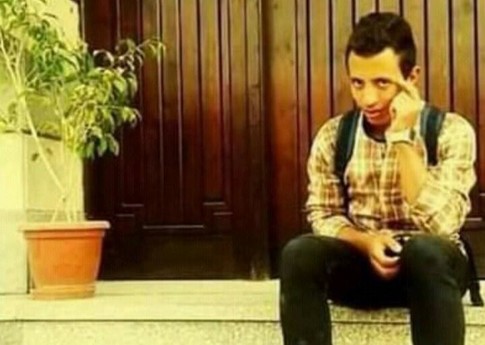The Egyptian authorities must not resort to the use of the death penalty to punish a young man who was arrested while under the age of 18, said Amnesty International, ahead of an expected verdict in his case on 22 June.
Karim Hemada was arrested aged 17 during a raid on his home in Giza in January 2016. He was forcibly disappeared for 42 days, and during this time, he reported being tortured with electric shocks to extract a forced confession according to documents sent to the Minister of Interior and the Public Prosecutor and information obtained by Amnesty International. His case was referred to the Grand Mufti, Egypt’s highest religious authority, on 6 June to seek his non-binding opinion for application of the death penalty.

“The death penalty is a cruel, inhuman and degrading punishment and its use after an appalling miscarriage of justice is deplorable. Instead of sentencing him to death the Egyptian authorities should halt the grossly unfair proceedings against him, release him from pretrial detention and launch an investigation into his enforced disappearance and torture allegations.”
The authorities should ensure that any retrial faced by Karim Hemada is fair and strictly adheres to the principles of juvenile justice. He must not be detained during these proceedings.
Although Egyptian law prohibits the use of the death penalty against juvenile offenders, since 2013, lower courts have sentenced at least three people to death for crimes that occurred while they were under the age of 18, before higher courts struck down the verdicts.
Karim Hemada’s case was referred to the Grand Mufti along with that of six other men accused of being a member of a “terrorist group” in the same case who could also be sentenced to death. Amnesty International opposes the death penalty in all circumstances and is calling on the Egyptian authorities not to use it against any of the individuals in this case.
Another defendant due to be sentenced on 22 June is Aser Mohamed, who was also arrested in January 2016 when he was a child aged only 14. He was held incommunicado for 34 days. During that time, he says he was tortured by members of the National Security Agency (NSA), including by being given electric shocks and being suspended from his limbs for hours in order to “confess” to crimes that he did not commit. He also said he was threatened by a prosecutor for the Supreme State Security Prosecution that if he did not cooperate, he would be sent back to the NSA. If convicted, he faces up to 15 years in prison.
Both Karim Hemeda and Aser Mohamed are facing charges of “membership in a terrorist group” as well as use of force, possession of firearms and assaulting police officers. The alleged offences took place between mid-2015 and 13 February 2016 when both men were under the age of 18.
The Egyptian authorities must put an end to horrific violations against children and ensure that the alarming pattern of sentencing juvenile offenders to death is halted immediately
Magdalena Mughrabi
“If the Egyptian authorities convict these two young men after their blatantly unfair trials relying on forced confessions this would be a flagrant assault on children’s rights. The Egyptian authorities must put an end to horrific violations against children and ensure that the alarming pattern of sentencing juvenile offenders to death is halted immediately,” said Magdalena Mughrabi.
The Committee on the Convention on the Rights of the Child has stated that prolonged pre-trial detention of children is a grave violation of international law. While Egyptian law identifies children as anyone under 18, it does however allow for children between 15 and 18 to be tried by criminal and supreme state security courts, if there are adults involved in the case. Article 112 of Law no.12/1996 on Children establishes an absolute ban on sentencing anyone that was under 18 at the time of committing the crime to death.

